Dental Implants – Beverly, MA
A Lifetime Solution to Tooth Loss
 Over the past three decades, dental implants have become the premier way for dentists all around the world to
replace any number of missing teeth. At Beverly Farms Dental, dental
implants in Beverly are usually the first recommendation we make to patients hoping to rebuild their smiles. Why?
Because they are the next best thing to natural teeth, and they’re able to create a beautiful restoration that
also safeguards a patient’s oral health at the same time. Interested in learning more? Read on below to see
why dental implants are becoming more popular by the minute. Then, just give us a call
when you’re ready to schedule your consultation!
Over the past three decades, dental implants have become the premier way for dentists all around the world to
replace any number of missing teeth. At Beverly Farms Dental, dental
implants in Beverly are usually the first recommendation we make to patients hoping to rebuild their smiles. Why?
Because they are the next best thing to natural teeth, and they’re able to create a beautiful restoration that
also safeguards a patient’s oral health at the same time. Interested in learning more? Read on below to see
why dental implants are becoming more popular by the minute. Then, just give us a call
when you’re ready to schedule your consultation!
Why Choose Beverly Farms Dental for Dental Implants?
- Partnered with Local Dental Implant Specialists
- Fair Pricing with Zero Hidden Fees
- Latest Dental Technology Used
What Are Dental Implants?
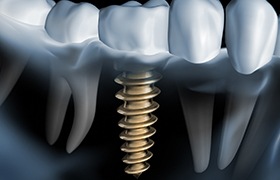
Most traditional tooth replacements only bring back the crown (top) of a tooth, but instead, dental implants rebuild both the root and the crown. The implant itself is a small titanium post that is placed directly into the jawbone by our trusted specialist. Then, it fuses to the surrounding bone and tissue in a process called osseointegration. From there, a metal abutment is affixed to the implant, which is used to secure a custom-made dental crown. Multiple implants can also hold a dental bridge or denture.
Dental implants essentially act just like the roots of the teeth you’ve lost. As a result, they deliver reliability, durability, and longevity that traditional methods simply cannot. They’re able to look and feel just like natural teeth. That’s why when a patient comes to us wanting to replace missing teeth, dental implants are usually our first suggestion.
The 4-Step Dental Implant Process
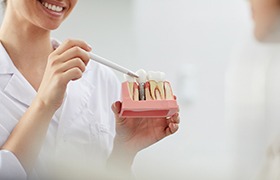
Getting dental implants requires a multi-step process that can take several months to finish. However, the long-term benefits they deliver make them worth the wait. Plus, we work with the best local dental implant specialists to ensure you’re receiving the highest quality of care. Here’s what you can expect during the dental implant process:
Initial Dental Implant Consultation

You’ll first need an initial consultation to ensure you’re a candidate for dental implants. Generally, if you have good oral and overall health, they are a suitable option if you’ve lost 1 or more teeth; however, we’ll also review a CT scan of your jaw to look for any hidden issues, like an infection or bone loss.
Many patients need additional procedures before their placement surgery, like bone grafting. This is often necessary for patients who have lost density in their jaw. The procedure adds thickness to any areas that are weakened.
Dental Implant Surgery

Sedation or anesthesia is needed to ensure you’re comfortable during your dental implant placement. You won’t feel any pain as your gum tissue is opened to expose your jaw. A small hole is drilled into the bone to insert the post. Your gum tissue is stitched closed, and you’ll spend the next several weeks healing.
Dental Implant Osseointegration/Abutment

The implant post will serve as a root, stimulating new bone growth. Your bone will fuse to the implant through a process called osseointegration. Initially, you’ll experience some pain and tenderness while your bone heals, which you can manage using an over-the-counter pain reliever. After a few days, your pain will subside, but it will take your bone a few more weeks to heal.
Delivery of Dental Implant Restorations

While your gum tissue is healing from your abutment procedure, the dental lab will be working hard to create your restoration to meet your exact needs. It’s made of all-ceramic material to look natural and blend in with any remaining teeth.
Benefits of Dental Implants

Dental implants replace the entire tooth structure, not just what’s visible from the surface. As a result, there are several benefits of dental implants that aren’t possible using any other solution. We’ll help you invest in your smile and your quality of life using an option that can last for a lifetime.
Flawlessly Restored Functionality

A titanium implant post is surgically placed into your jawbone to act as a new root. An abutment is attached to the post to connect a custom-made restoration. Together, the three components create a nearly perfect replica of your natural tooth. You’ll benefit from unmatched stability to chew, bite, smile, and speak without any worry. In fact, you’ll regain as much as 70% of your natural biting force to enjoy your favorite foods again. You’ll have the oral functions you need to maintain a balanced diet.
Easy Maintenance

Besides looking and functioning like your natural teeth, you will also care for them similarly as your real smile. You won’t need any expensive cleaning products. Instead, brush your teeth at least twice a day using a soft-bristled toothbrush and nonabrasive floss. Use a high-quality dental floss to clean in between each remaining natural tooth and around your abutments each day. Some patients find a water flosser to be easier to use to clean hard-to-reach areas, like around your dental implants.
Long-Lasting Solution

Dental implants are the most reliable solution to replace missing teeth. Whether you’ve lost a single tooth, multiple teeth, or an entire arch, implant-retained prosthetics have the potential to last for several decades with the right aftercare. With over a 95% success rate, you’ll invest in a long-term solution that can last for a lifetime, so you’ll never need to worry about paying to have it replaced.
Jawbone Preservation

It’s common to lose density in your jaw after you’ve lost a tooth because your bone isn’t being stimulated by the root. Over time, you’ll have an increased risk of several new complications, like cavities, gum disease, and even additional tooth loss. While other dental prosthetics can help slow the issues associated with missing teeth, there’s only one treatment that stops bone loss.
With an implant post acting as a new root, a dental implant stimulates your jaw to encourage new bone growth. This provides any remaining natural teeth with the support they need to stay in place. It also prevents your facial tissues from sagging to maintain a youthful appearance.
Who Dental Implants Can Help

Dental implants are a very versatile treatment that can accommodate many use cases. Whether you need a single tooth replacement, a whole row, or even an entire arch, dental implants can help by supporting various prosthetics. But what makes a great candidate for this exceptional treatment? Read more below to learn the qualities we look for at Beverly Farms Dental and how we can help you achieve your goals with dental implants.
Who Is a Good Candidate for Dental Implants?

There are few solid requirements for dental implant placement. And even if you don’t meet the bar at the time of your initial consultation, we have the means to help you get there. Here are the most important aspects we look for in a dental implant candidate:
- Good Overall Health: We don’t expect our patients to run marathons, but they must be free from health issues like uncontrolled diabetes and gum disease. These conditions can cause inflammation that complicates the healing process after surgery.
- Adequate Jawbone Density: Your jawbone needs to be thick enough and robust enough to support your implant. If it isn’t, we can perform a bone graft to build up the area before your procedure.
- Commitment To Oral Hygiene: Dental implants are a lifelong commitment, so you should be prepared to improve or maintain your oral hygiene routine. This ensures your implant will stay solid for decades.
Missing One Tooth

The American College of Prosthodontists estimates that roughly half of the adult population in the US is missing at least one tooth. This makes a single dental implant one of the most popular options when it comes to tooth replacement. The implant fixture will support a customized dental crown that will outlast other tooth replacements like dental bridges or dentures.
Missing Multiple Teeth

If you’re missing more than one tooth in a row, an implant-supported bridge can seamlessly fill the gap. This procedure uses two implants to hold crowns fused with false teeth called pontics in place. This is a more cost-effective way to bridge the space between your teeth than individual implants. However, if you have several missing teeth throughout your mouth, multiple individual implants can be accommodated.
Missing All Teeth

Even if you’re missing all your teeth or currently use a traditional denture, dental implants can help improve your smile. We can strategically place four to eight implants throughout your mouth and then place a special implanted denture over them. This creates a prosthetic that looks and feels just like your natural teeth! Implanted dentures are very stable, eliminating the possibility of embarrassing slippage during meals or conversations.
Learn More About Implant Dentures
Understanding the Cost of Dental Implants

Dental implant restorations dotend to cost more than traditional bridges or dentures, but they are the most cost-effective option over the long term. Why? Largely thanks to their longevity. Regular bridges and dentures typically need to be completely replaced every five to 10 years, while dental implants can easily last for 30 or more, saving a patient thousands in maintenance and retreatments over time.
It should be noted that the overall cost of the implant procedure can vary quite a bit from person to person depending on their particular needs, such as how many teeth they want to be replaced and where they are located in the mouth. How much will dental implants cost you? We can tell you everything you need to know at a one-on-one implant consultation. Give us a call to learn more about the cost of dental implants in Beverly or to schedule your appointment today.
Preliminary Treatments & Dental Implant Surgery

Unlike traditional methods, replacing a tooth with a dental implant involves several steps, each with separate costs. It will take a few months to complete the entire process, which can make it easier to afford your new smile. You won’t need to pay the entire amount upfront. Instead, you can pay for each step in your treatment separately. Although every plan differs, you can expect to pay for:
- Initial consultation & diagnostic imaging
- Additional/preliminary treatments, like periodontal therapy or bone grafting
- Sedation or anesthesia
- Placement surgery
- Dental implant posts
- Abutments for each post
- Restoration(s)
The placement surgery itself will also vary based on several factors. These may include the location where the implants will be placed, the kind of dental sedation used, and even the experience of your implant dentist. We are partnered with a local implant specialist, so you’ll want to consult them to receive a more exact price for your placement surgery.
The Parts of Your Dental Implant
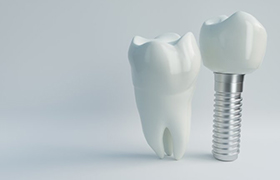
There isn’t a set fee for dental implants because the price is based on your specific treatment plan. Various factors can influence the amount you’ll pay, including:
- Type of restoration: Your dental implant can be fitted with crowns, dental bridges, partials, or full dentures, each with its unique price range.
- Number of dental implants: The more implants you need, the higher the cost of treatment.
- Size or material: The metal posts can come in various sizes, shapes, and materials depending on your dental needs. This will impact the overall cost.
- Dental implant brand: Our team uses the most reliable and trustworthy brands for high-quality dental implants.
How Dental Implants Can Save You Money

It’s no secret dental implants are expensive upfront; however, they are the long-term affordable solution. As the only treatment to replicate the root, they keep your jawbone strong to stop dental drift. This lowers your overall oral health expenses by reducing your risk of tooth decay, gum disease, and additional tooth loss.
In addition, dental implants are also the most reliable option to treat missing teeth. They have over a 95% success rate to last for several years with the right aftercare, like maintaining your oral hygiene and visiting your dentist regularly. You should never need to pay to have them replaced to save money down the road.
Does My Dental Insurance Cover Dental Implants

Every policy is different, but many dental insurances can be used to cover a portion of the cost after paying your yearly deductible. You can use your annual allowance to lower the amount you need to pay for certain steps in your treatment, like periodontal therapy, X-rays, or the restorations. We’ll work on your behalf with your insurance carrier to lower the amount you will have to pay out-of-pocket. If you owe a remaining balance, we will help you find the solutions you need to keep your new smile affordable.
Making Dental Implants Affordable

Even if you don’t have dental insurance, it doesn’t mean you’ll be completely left on your own. Our team understands the importance of being able to afford the necessary restorative treatments to renew your smile. That’s why we’ve partnered with CareCredit—a third-party financier that can help break up the overall price of dental procedures into smaller monthly installments. These often come with little to no interest, meaning you can work within your budget to effectively restore your pearly whites!
Dental Implant Technology
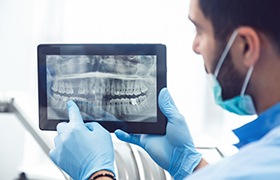
Through advanced dental technology, our dentists can not only ensure a more successful and predictable treatment, but a more comfortable one as well. By using the instruments at our disposal for your future tooth replacement, you can expect results that are more precise and longer-lasting, causing fewer surprises in the long-term. Keep reading to learn about the dental implant technologies you can expect when visiting Beverly Farms Dental.
CBCT Scanner
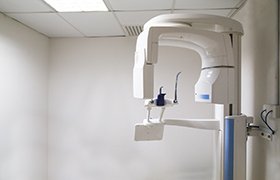
Digital X-rays play a major role in examining the many structures of your mouth and jaw and catching potential issues with your mouth before they turn serious. However, they sometimes aren’t enough to complete certain procedures, including dental implant placement. For example, digital X-rays only provide a 2D image of your mouth, whereas CBCT (or cone beam computerized tomography) scanners can provide a full 3D image for a more detailed evaluation.
Because CBCT scanners offer more information about your mouth, we can make your dental implant placement that much more precise. For example, following your scan (which only takes a few minutes to complete and is painless), we’ll have a better understanding about the exact condition of your bone tissue and unique locations of your nerve endings, blood vessels, sinuses, and other sensitive oral structures.
Additionally, those who need to have multiple dental implants placed (such as for implant dentures) can have greater confidence knowing that the thickest portions of their bone tissue will be utilized to the fullest extent.
Trios Digital Impression System

Typically, dental restorations are created using a gray, putty-like impression material. To capture a mold of your mouth, patients bite down into the impression material so it can be cured and sent to a dental lab. There, technicians use it to create personalized restorations, including dental crowns, bridges, and dentures (either traditional restorations or those specifically for dental implants).
Unfortunately, this process can be quite uncomfortable for some. In other cases, the mold can be compromised, forcing patients to redo the impression process. By opting for digital alternatives such as the Trios digital impression system available at our office, you can skip the gray putty altogether.
The device consists of a handheld wand that captures hundreds of images of your teeth, gums, and other oral structures in a matter of minutes. From there, the images are sent to a nearby computer where they are recompiled into a 3D image. This image can then be used to design your future implant restoration. The result is a natural-looking crown, bridge, or denture that is not only incredibly lifelike, but comfortable inside your mouth. Opting for digital capture methods also reduces the risk of human error, ensuring your bite remains as even as possible after the restoration has been attached.
Maintaining & Caring for Your Dental Implants

The success or failure of dental implants depends largely on the kind of care you give them. With the right habits and proper precautions, you should be able to get decades of usage out of your implant posts without needing to have them replaced. Below are some basic tips for taking care of dental implants on a daily basis; by following these steps, you can protect your implants from the infections and injuries that could potentially compromise them.
Make Oral Hygiene a Priority

Even though dental implants aren’t made of enamel and aren’t susceptible to decay, you still need to keep them clean. Any bacteria that accumulates on your implants could eventually spread to your other teeth or attack the nearby gum tissue, leading to numerous oral health issues. Gum disease is a particularly common cause of implant failure. As such, you should stick to a strict oral hygiene routine of brushing twice a day, flossing at least once a day, and rinsing with mouthwash that has been approved by the ADA.
Eat a Healthy Diet

Once your implants have fully joined with your jawbone, you can eat whatever you want. Make sure your meals include plenty of fruits, vegetables, leafy greens, dairy products, and lean proteins. Aside from the obvious benefits such foods have for the rest of your body, they will also help you maintain healthy gums. Make sure you’re getting plenty of calcium and vitamin C, as these nutrients are particularly key for keeping the gums and jawbone in good shape.
Break Bad Habits

There are a lot of habits that you might not think twice about but can lead to major implant damage in the future. Try to avoid:
- Smoking or the use of any other tobacco products
- Biting your fingernails
- Chewing on pens and pencils
- Crunching ice, hard candy, and other extremely hard foods
- Opening packages with your teeth instead of an appropriate tool
In short, basically any habit that put your natural teeth at risk can also potentially lead to implant failure.
Protect Your Dental Implants

In addition to avoiding bad habits, you’ll also want to make sure your implants are well-protected in high-risk situations, such as while playing sports. During your next visit, you can ask for a custom-made mouthguard. This simple device will absorb the shock of any blows to your head or face, keeping your implants safe from the worst of the damage. A mouthguard is also useful for protecting your implants from wear and tear if you grind your teeth at night.
Schedule Regular Dental Checkups

Every six months, we recommend that you return to our office in Beverly. While we’re checking for cavities and removing the plaque and tartar from your mouth, we can also review your implant posts and restorations to see if there are any problems that need to be addressed right away. Regular preventive care goes a long way towards extending the lifespan of dental implants.
Dental Implant Failure & Salvage
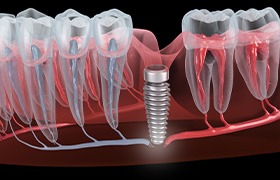
Dental implants should feel natural inside your mouth and stay firmly in place at all times. If they are causing you pain or have come loose, it’s a sign that they have failed. But don’t worry; our team is ready to help should the worst happen! Once we’ve examined your mouth, we can identify what caused the failure and figure out the best way to treat the problem so that you can protect your newly recompleted smile.
Learn More About Dental Implant Failure & SalvageDental Implant FAQs

Are you considering dental implants but are not sure if they are right for you? Our knowledgeable staff has collected some of the most common questions about dental implants in Beverly and answered them below. We hope you find these FAQs helpful! If you still have questions after reading the information that follows, do not hesitate to contact our office.
Am I Too Young to Get Dental Implants?
Dental implants are typically not recommended for patients younger than 18, as their jaws may not be fully developed. In general, men’s jaws take longer to develop than women’s jaws. If dental implants are placed before the jaw is finished growing, it could interfere with further bone development and potentially result in complications. If you are a teenager or young adult and want to replace missing teeth, talk with Dr. Tolzmann, an experienced implant dentist in Beverly, about which restorative treatment may be best for you.
How Long Does It Take to Recover from Dental Implant Surgery?
While every case is different, you will likely be able to resume your normal activities the day after implant surgery. Take prescribed or over-the-counter pain medication as directed to reduce any discomfort. In general, bleeding should stop after the first couple of days, and swelling should stop after three to four days. Be sure to avoid strenuous exercise for the first week or so, as it could delay healing. While recovery from implant surgery can be swift, remember that it can take up to six months for your implants to fully fuse with your jawbone.
Do Dental Implants Decay?
No, dental implants and the restorations they support are not made of enamel, so they cannot get cavities. However, the gums around an implant can still become infected. In addition, your remaining natural teeth are still susceptible to tooth decay. In order to prevent cavities and avoid infections that could lead to implant failure, be sure to continue practicing excellent oral hygiene.
What Can Cause Dental Implants to Fail?
While uncommon, dental implant failure usually occurs for one of two reasons:
- Peri-implantitis – A form of gum disease that can damage the bone and gums supporting a dental implant. Peri-implantitis typically develops due to poor oral hygiene.
- Failed osseointegration – Sometimes implants fail to integrate with the surrounding bone, especially when patients do not have a strong, thick jawbone structure.
Other causes of dental implant failure may include chronic teeth grinding, tobacco use, poor oral hygiene, and certain medications. Diabetes, cancer, osteoporosis, autoimmune disorders, and certain other health conditions may also reduce the chances of successful implant treatment.
It’s important to keep in mind that dental implants have an extremely high success rate of over 95%. Moreover, you can rest assured that your dentist will provide guidelines for minimizing your risk of implant failure.
Do Dental Implants Make You Look Younger?
Yes! While it may sound too good to be true, dental implants in Beverly can make you appear younger and more vibrant. The force of biting and chewing spreads through the roots of your teeth to stimulate your jawbone. When teeth go missing, the jawbone loses that stimulation and begins to deteriorate. Without a full jawbone to support your facial structures, you may eventually appear more wrinkled, with a sunken-in face and fine lines around your mouth. Dental implants, however, stimulate the jawbone by replacing the missing tooth root structure, preventing bone deterioration and helping you retain a more youthful appearance.
How Long Do Dental Implants Last?
You can expect your dental implants to last anywhere from several decades to a lifetime. Of course, the lifespan of your restorations will depend heavily on your oral health and lifestyle habits. For instance, you’ll still need to maintain good oral hygiene and care for your implants just as you would your natural pearly whites. This means you should brush for two minutes twice a day, floss daily or after every meal, and rinse with mouthwash frequently. Visiting our dental team for routine checkups and cleanings every six months will ensure that we can catch and address any developing issues before they become a problem down the road. Even though your dental implants will be durable, you’ll also want to avoid chewing on anything too hard, crunchy, or sticky as well as refrain from using your teeth as tools.
Does Getting Dental Implants Hurt?
Similar to most other extensive dental treatments, our team will make sure to completely numb your mouth before starting any work on your implants. Although you shouldn’t feel any pain during your procedure, you may experience mild soreness, sensitivity, or discomfort for several days after your appointment. Fortunately, these symptoms are usually short-lived and can easily be managed with over-the-counter pain relievers. You can also apply a cold compress to the outside of your mouth to alleviate discomfort and minimize any swelling. However, if your sensations persist after a few days or worsen, be sure to contact us for help.
Will I Have to Take Off Work for Dental Implant Surgery?
Most people will only need to take one or a couple of days off of work to undergo dental implant treatment. This may change depending on each patient’s case. Those with jobs that are more physically demanding will likely need to take at least three or even four days off so that they can have plenty of rest for recovery. Heavy exercise or strenuous activities can divert blood away from the surgical site, delaying the healing process significantly. To avoid any complications, you might consider scheduling your procedure at the end of the week, like on Thursday or Friday, so that you can have more time to relax on the weekend.
Can I Get Dental Implants If I Smoke?
While it may be possible to get dental implants if you smoke, you’ll have a much higher chance of failing the treatment. Firstly, smoking or chewing tobacco (or even vaping) can cause your mouth to dry, which can disrupt your healing process and your implants’ capacity to bond with your jawbone. This habit can also result in dry socket—a condition that affects your surgical site and may dislodge the blood clot that is supposed to form around your implants. This is a great opportunity to start quitting smoking altogether, and our team can offer the resources, guidance, and support to help you. However, if this isn’t possible, then we recommend that you at least quit two weeks before your treatment and wait about two or three months after for the best results.

